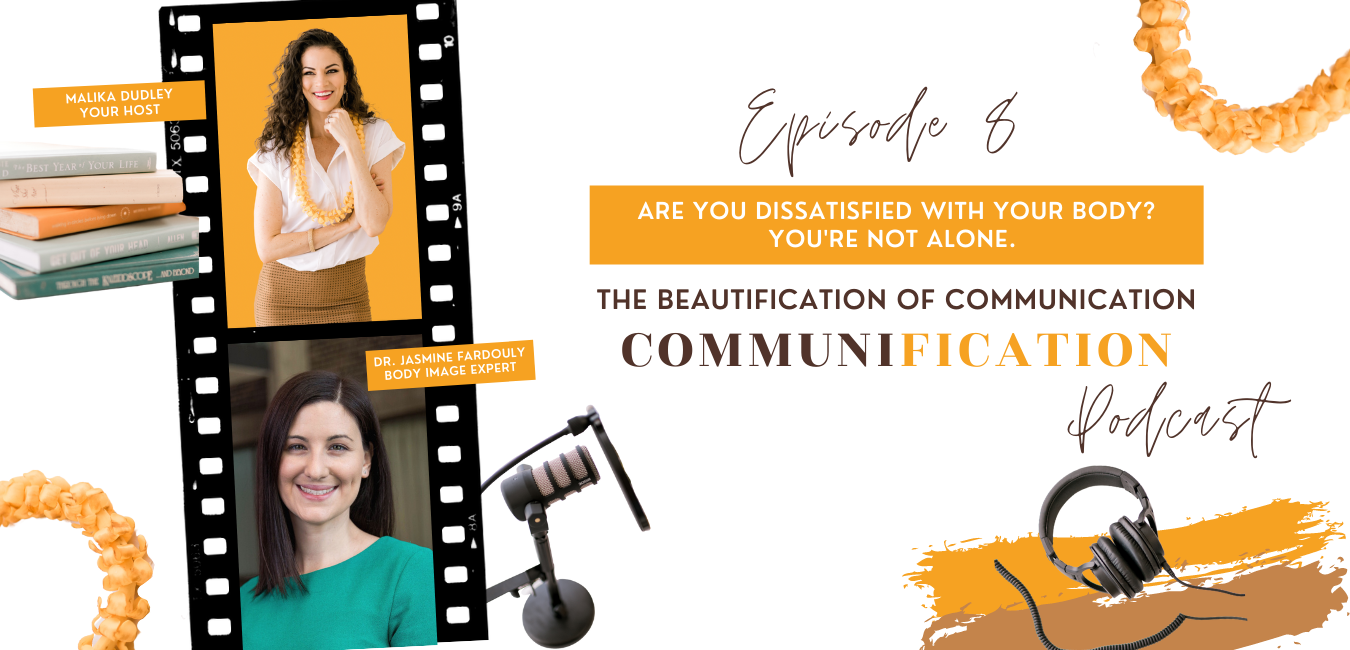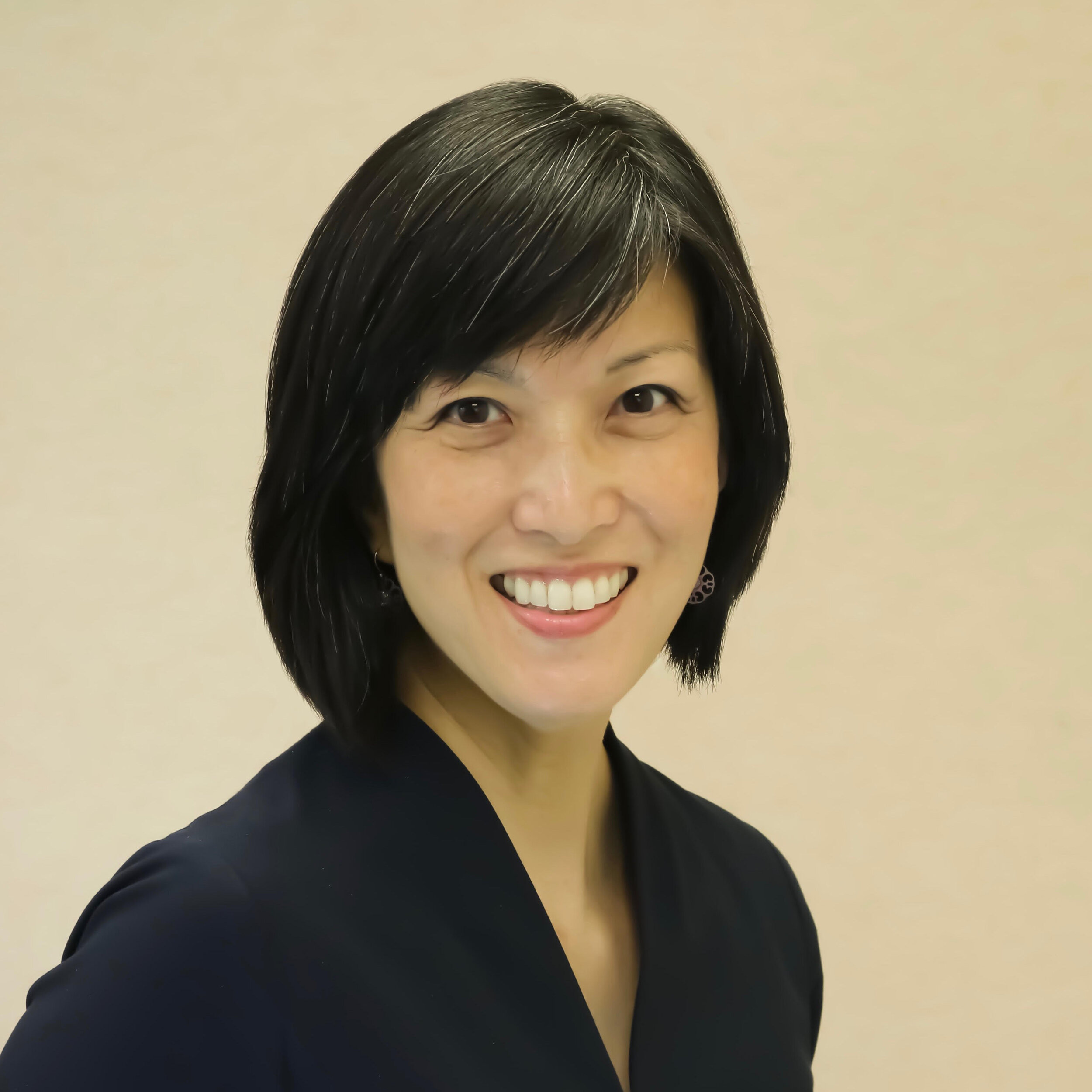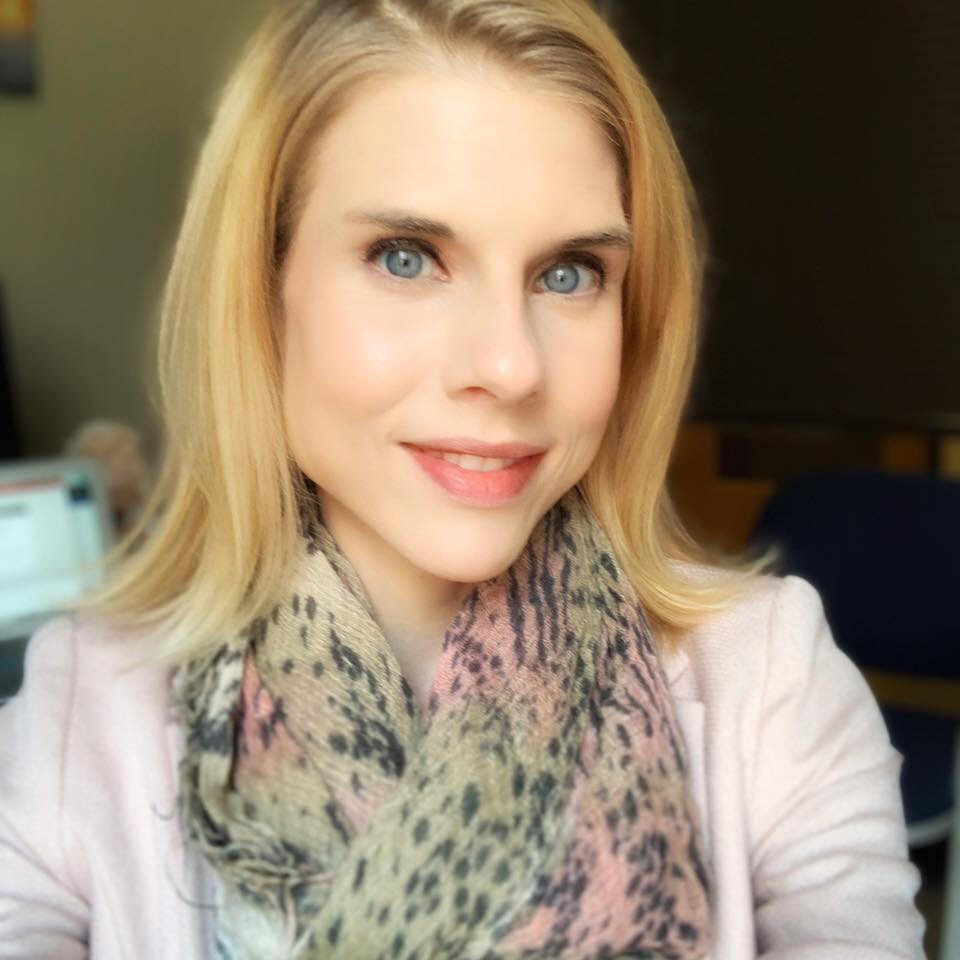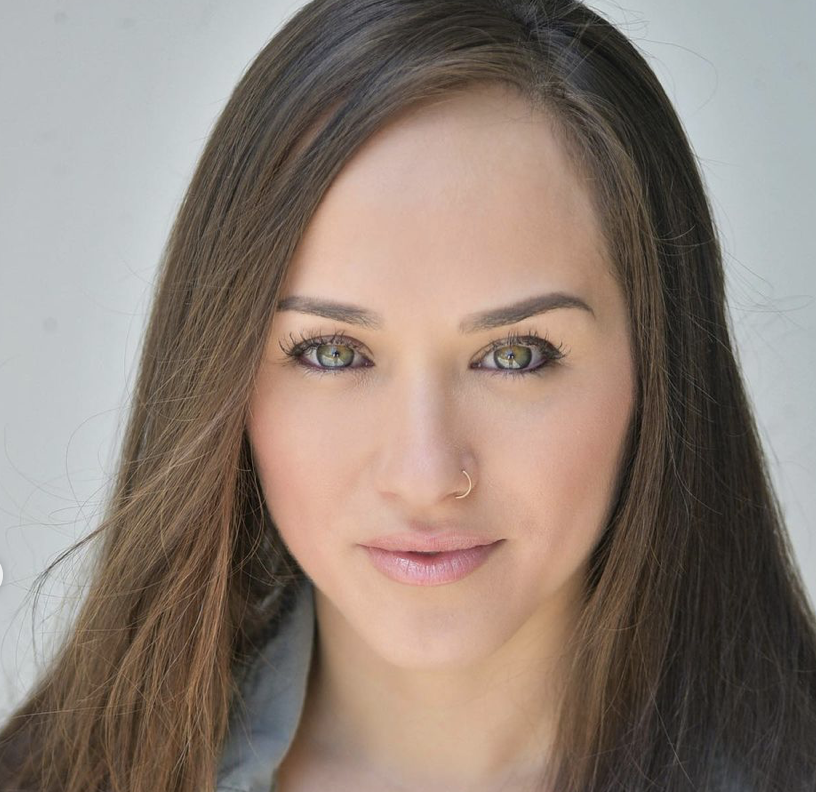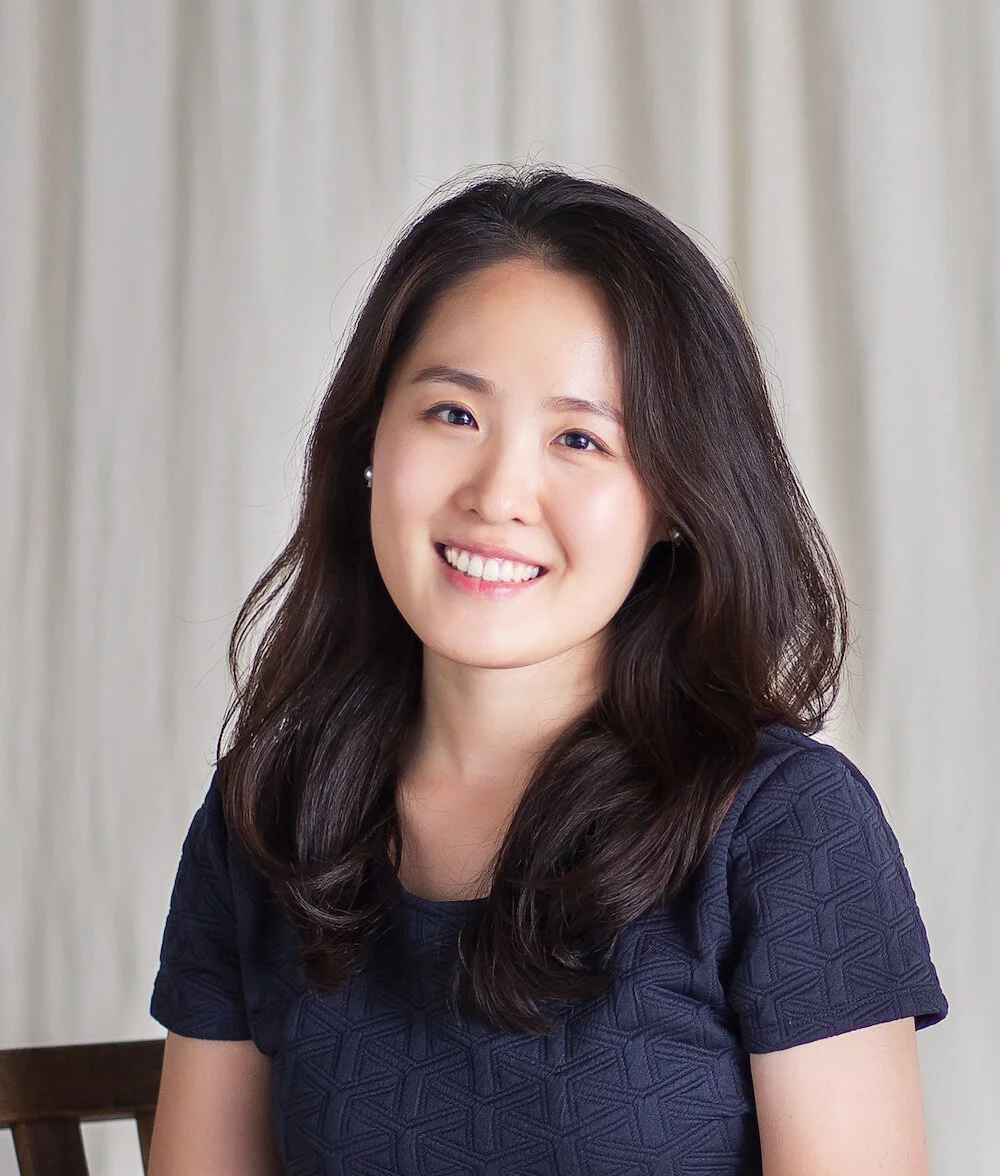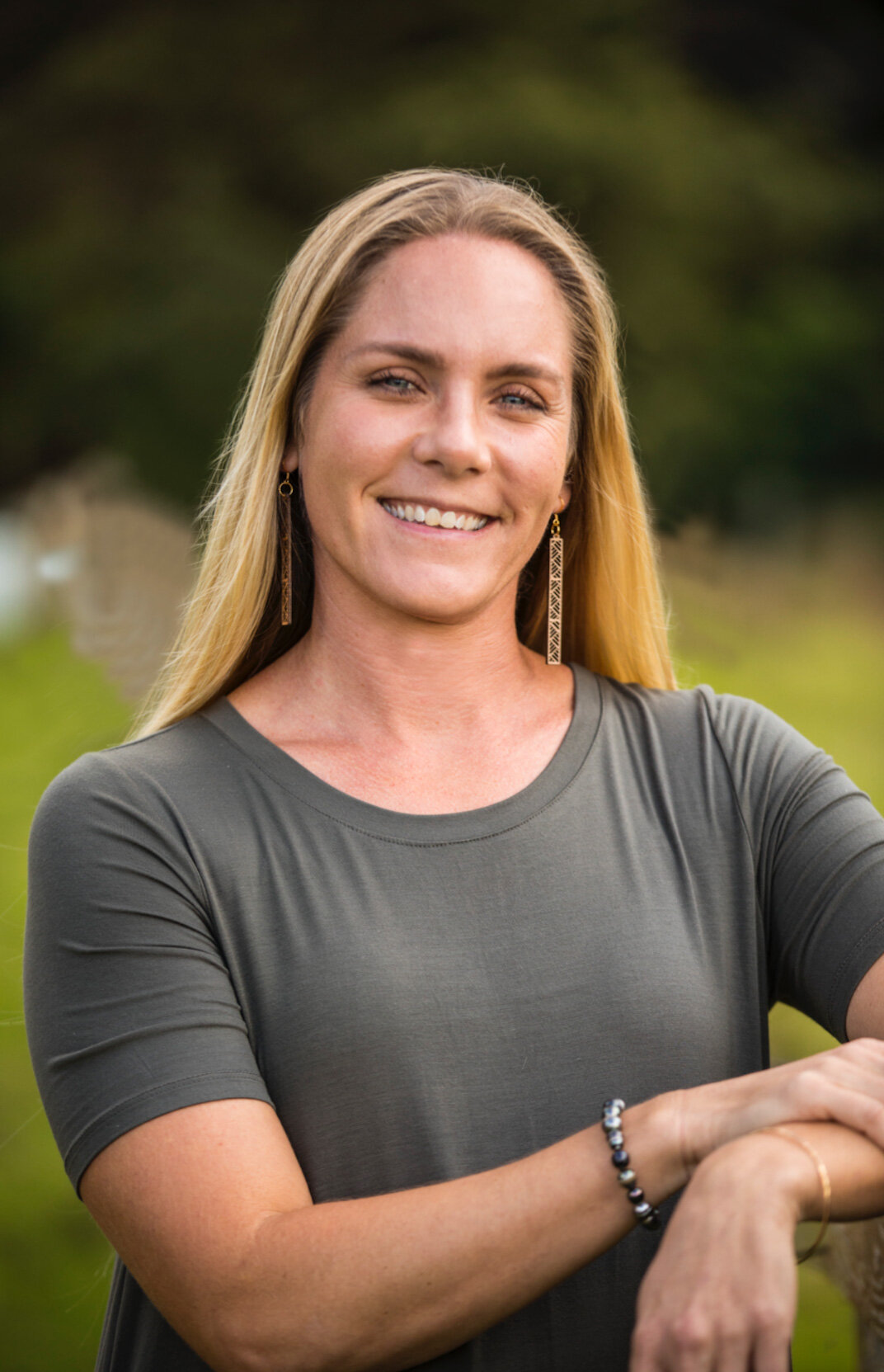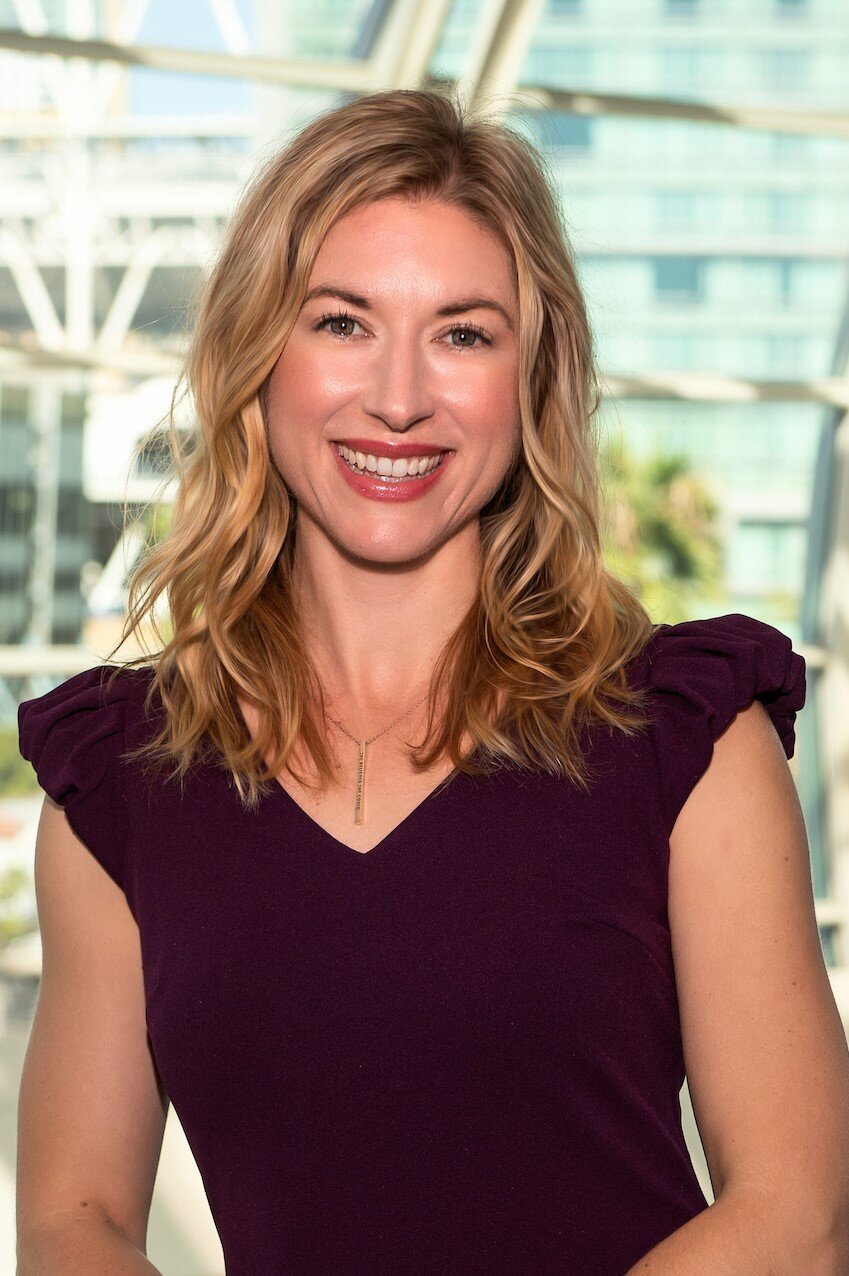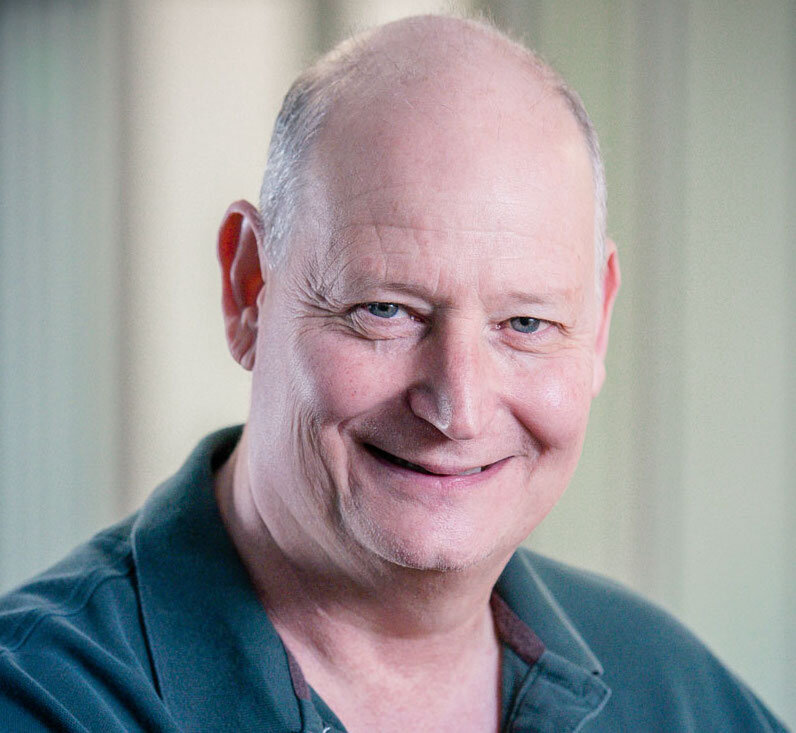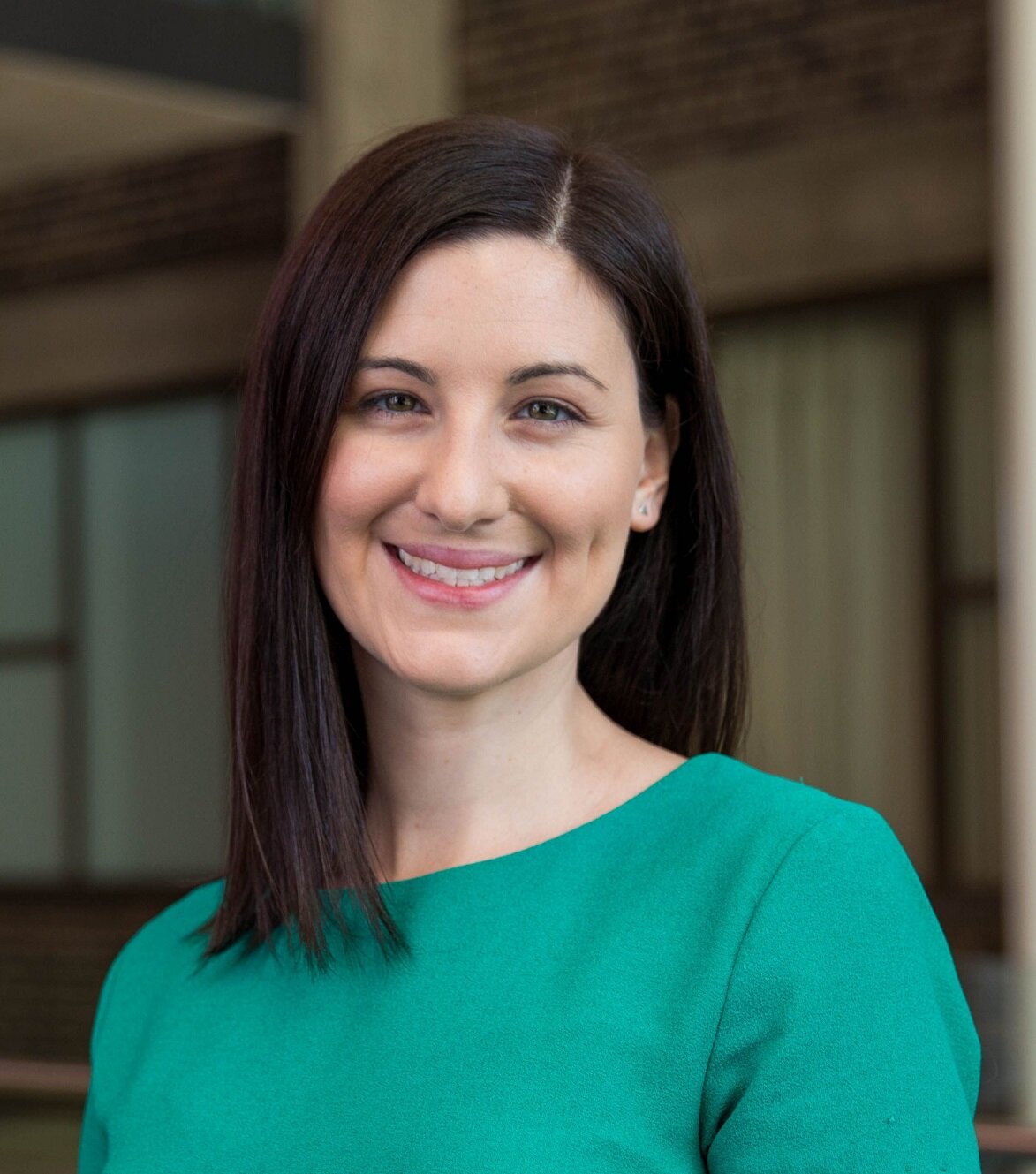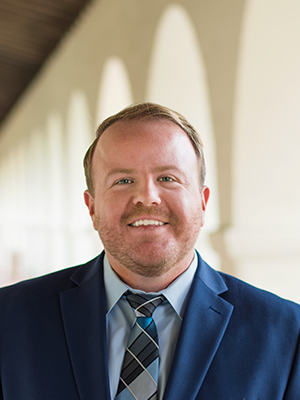Ep. 8: Body Image + Social Media, Dr. Jasmine Fardouly
Below you will find the show notes for “Episode 8” of the Communification Podcast.
Mahalo for listening! Welcome to the ‘ohana!
In this episode we talk to Dr. Jasmine Fardouly. She has a lovely Australian accent (I love listening to her speak), and she has some really great insight into how social media is impacting our body image. Not just young girls, but also boys, men, and women.
Main takeaways
1. More than 50% of young people are unhappy with the way they look.
2. Body dissatisfaction is not just a problem for young girls, but for women, young boy, and men too.
3. Beauty ideals are socially constructed. Read that again.
4. We tend to make upward comparisons. How does that impact us?
5. You have control. You create your social media environment. Be intentional with what you create for yourself.
Time codes
GUEST: Dr. Jasmine Fardouly
[07:03] WHY DR. FARDOULY GOT INTO THIS TYPE OF RESEARCH
[11:30] BODY DISSATISFACTION IS AT LEAST AT NORMATIVE LEVELS
[13:46] LISTENER QUESTION FROM NELSON G.
WHAT IMPACT DO FILTERS HAVE ON OUR BODY IMAGE? IS THERE A GENDER DIFFERENCE?
[18:52] SOCIAL COMPARISON THEORY AND SOCIAL MEDIA
[22:15] UPWARD COMPARISONS, DOWNWARD COMPARISONS, AND LATERAL COMPARISONS
[24:04] LISTENER QUESTION FROM MELISSA P.
IS THERE RESEARCH SHOWING DIFFERENT PSYCHOLOGICAL IMPACTS BASED ON AGE?
[28:05] COMPARING OURSELVES TO ACQUAINTANCES, FRIENDS, FAMILY, STRANGERS, AND CELEBRITIES
[30:54] DIFFERING IMPACTS FOR DIFFERENT AGE GROUPS
[33:38] WHAT CAN PARENTS DO TO HELP THEIR CHILDREN WHEN IT COMES TO BODY IMAGE AND SOCIAL MEDIA
[35:08] WARNING SIGNS THAT THERE MIGHT BE A PROBLEM
[37:42] RESEARCH-BASED STRATEGIES TO HELP US NAVIGATE THIS PROBLEM
[42:41] BEAUTY IDEALS ARE SOCIALLY CONSTRUCTED
Dr. Jasmine Fardouly bio
Dr Jasmine Fardouly is a Research Fellow working in the Department of Psychology at UNSW Sydney in Australia. Her research interests include social influences on the emotional health of young people, particularly the influence of social media. Over the past ten years she has taken a mixed methods approach to investigate negative social media activities for young people’s body image and eating pathology, such as the impact of online appearance comparisons. More recently, her research focuses on ways to foster positive body image via social media. She is passionate about making social media a safe environment for youth.
EPISODE 8:
Malika:
Aloha Dr. Fardouly! How are you?
Dr. Fardouly:
Hi, thank you. Thanks for having me.
Malika:
Thank you for joining us today on the Communification Podcast, this topic created a lot of discussion on social media and Clubhouse. Our listeners had lots of thoughts and feelings, and it really seemed to get deep, vulnerable, and personal very quickly when we opened discussion on this issue of how social media is impacting our body image, and I'm positive that your presence on the show is going to be so valuable to all of us. So we are so delighted to have you with us today. Welcome.
Dr. Fardouly:
Thank you. Thank you. Yeah, I think it's an important topic for so many people because we all use social media and body image is just an important topic for most people. Yeah, hopefully a lot of people will find this helpful and interesting and good to know there's some interest.
WHY DR. FARDOULY GOT INTO THIS TYPE OF RESEARCH
Malika:
I thought first, we would start getting to know you a little bit. So what drew you to this particular field and why are you so passionate about this subject area and feel free to also introduce us to any type of research that you do.
Dr. Fardouly:
I think one kind of reason I'm interested in this topic is just that…
…from a young age, we're taught that being physically attractive is important for our self worth and that if we're attractive, then we're going to be happy and have successful lives. And in reality, that's just not true.
And a lot of people invest so much time and energy and money into trying to look a certain way or to meet beauty ideals, and be physically attractive. And they're not happy with their appearance anyway. And so I think seeing that and experiencing that, really made me quite passionate about this topic.
We know that body image affects so many people, there is a recent study done by Dove where they interviewed girls and women from over 13 different countries. I think there was over 10,000 people in their survey, and they found that over 50% of young girls were unhappy with their appearance.
And in some cultures it's up to 90 plus percent. So we know this is a really widespread problem and body image concerns can be really impairing. They can impact so many different aspects of our lives.
We know that body image has an important influence on depression and eating disorders. It's also linked to poor self-esteem, unhealthy eating and exercise behaviors, and that's also linked to poor academic performance.
Girls who are more unhappy with their appearance also perform worse at school. So it can really have long term impacts on people's lives. And, without getting too deep - life is short and it's precious, and if we're spending a lot of time and energy investing into something that, we may never achieve and isn't likely to make us actually happy then I'm really passionate about trying to improve body image so that people can spend their time on things that are more likely to be fruitful and give them sense of purpose.
Social media is one aspect of body image. So it's one piece of the puzzle, but it's something that we spend a lot of time on and most people use social media, and I think research suggests that on average, it's about two hours a day that young people spend on social media. There is certainly a lot of potential there for it to impact how we think and feel. And when I first started looking at this topic before I started my PhD, there wasn't really much published in the area. So there was a load on magazines, but at the time we didn't really know much about social media.
I noticed you hop on a bus or train and you look around and everyone's on their phones. And a lot of people are scrolling through their news feeds and just looking at attractive picture after attractive picture of people that you know, or don't know. And so I think, yeah, that's why I was really interested in looking at what impact that is having on body image. And I've been researching that for almost 10 years now.
Malika:
Wow. I think that you can really help a lot of people with this and you work on the ground trying to help young girls and young people through these issues. Can you tell me a little bit about the projects you work on?
Dr. Fardouly:
So I'm working on a few different projects. A lot of the research I'm doing now is with teenagers and young people, and we do just lots of different studies. We do studies in schools where we survey kids every year. We also do studies where we get them to complete surveys on their phone a few times a day, asking about what they're doing on social media and how they're feeling. I'm also doing a bit of research, looking at more positive aspects of social media. So that's what I'll be focusing on the next few years, looking at how we can make social media a more positive environment. What kind of activities or behaviors we could encourage young people to do, and whether they're actually likely to do it, which I think is really key because I think we can say to teenagers, you should be doing these types of things, but if they're not actually going to do it, it's just, it's not really helpful is it? So trying to find techniques that are acceptable to young people, but also getting some evidence to know what is actually going to be helpful.
BODY DISSATISFACTION IS AT LEAST AT NORMATIVE LEVELS
Malika:
That is so exciting. Oh my goodness. Okay. Let's dive right into the issue. So why don't we talk a little bit about body dissatisfaction. Is it at normative levels? Is it normal for people... especially young people to be dissatisfied with their bodies. That study that you talked about, it seems like there might not even be a cultural difference that now maybe with global media, that this is just “us,” we're all dissatisfied.
Dr. Fardouly:
It really depends on the research study with the actual, specific number with how prevalent it is, but there's usually agreement among researchers that it's at least normative.
More than 50% of young people are unhappy with the way that they look. And it doesn't seem to be constrained to any particular country.
There is some really interesting research looking at the introduction of western media into certain cultures. So there was some interesting research done in Fiji where they looked at body image concerns and eating disorder symptoms before they had television and after they had television and there was quite a steep increase in body image concerns after people were exposed to kind of Western media ideals. It does seem to be widespread, especially in high-income countries. So it probably does differ a little bit by culture. So in that Dove study, I think it was in Japan where it was over 90% of young people reported body dissatisfaction, but average across all of the cultures, it was, I think 54%, the exact number is hard to get at.
But yes, it does seem to be at least normative. And it does seem to be something that young people are quite concerned about. I know in Australia, there's a youth mental health survey that gets done every year, large number of young people. And every year, since it's been done, young people have been saying that body image is in their top three things of personal concern.
Young people are telling us this is an issue for them, and it's an issue for most of them. And it's not just a problem for girls and women. Boys and men also report body dissatisfaction. It's quite widespread.
Malika:
That's a nice transition into our first question from a listener. He wants to know more about, if there is a gender difference or not, and wanted to ask about filters. So is it okay if I play that?
Dr. Fardouly:
Yes, of course.
Malika:
All right. This question is from Nelson.
LISTENER QUESTION FROM NELSON G.
WHAT IMPACT DO FILTERS HAVE ON OUR BODY IMAGE? IS THERE A GENDER DIFFERENCE?
Nelson:
Aloha Malika and Dr. Fardouly. Thank you for having me on your podcast. I was wondering if filters for social media and pictures are bad for self image, self-confidence, and do they set an unrealistic expectation for reality? Is there a gender difference? Thanks for taking the time to answer my question.
Malika:
So maybe we can split this into two parts. Let's break it into first into filters and unrealistic expectations.
Dr. Fardouly:
Great question Nelson. It would depend on the filter. Some filters are fun and they make your head look like a pineapple or, they distort your image in a really funny way, and they're not likely to impact body image, but there are other filters that are designed to enhance the way that you look and using those appearance enhancing filters are likely to be bad for body image and self image. And that's because they're promoting a beauty ideal, which is promoted in lots of different aspects of society, not just on social media, but it's a beauty ideal that's very specific, very narrow and not achievable for most people.
We're born into bodies that are diverse. They're all different shapes and sizes. And I think that's wonderful, but the beauty ideals are specific. So one particular look for men and boys and one particular look for girls and women. And if we're all trying to achieve this one particular look, try to look the same and trying to be different from how we are born, then we're really trying to achieve something that just isn't attainable.
I think that's where filters can be harmful is because they are promoting a beauty ideal that is not realistic and that's not real, and it's not achievable for most people. If we're looking at those types of filtered images, then people can take those ideals on themselves, that's important for them to look that way and then that can encourage people to engage in unhealthy diet and exercise behaviors, or even engage in other types of behaviors, like interesting cosmetic surgery or other aspects to change their appearance. But also if we're posting images using filters, then that can also impact body image because we're looking at ourselves as objects rather than as people.
We're manipulating, we're taking an image of ourself and we're manipulating it as if we are an object and research suggests that when we engage in those types of behaviors, we can start to think of ourselves from a third person perspective and become more aware of how we're appearing to others rather than kind of being conscious of our own perspective out.
And it can also over time lead to us focusing more on our appearance than on other aspects of ourselves, such as our skills, or even to focusing on the appearance of our body over the function of our bodies. So using filters could also really lead to more, what we call, self objectification.
I think yes, filters can be bad for body image. It would depend on the filter and when it comes to the second part of the question.
So when it comes to gender differences, girls seem to engage in more of these behaviors than boys, and they often will also report more body image concerns than boys. But if boys are engaging in these behaviors, so if boys are using filters, then it has the same impact as girls.
So the relationship between social media and body image, more and more research suggests it's the same, regardless of gender, even though girls tend to engage in those behaviors more, if boys are viewing filtered images, if boys are using these appearance enhancing filters themselves, then it also seems to have the same impact on body image.
Malika:
Wow. That was a lot to take in, and I don't think I'd ever heard that perspective of - as the content creator - of how that could impact you as a person, your own self evaluation. So that was really interesting to hear, some of you listening might also have heard our episode with Dr. Spottswood, where we talked about the positivity bias. That's when we tend to present our best selves, both in-person and online, and that in itself is not necessarily a bad thing. We all do it. We've done it since before time. But when you're a content creator, when you choose to perpetuate these unattainable ideals by altering our images.
And now we know that it also impacts our own self image and evaluation as well, or as a consumer, when we fall into that trap of comparing our offline selves to these online hashtag fitspo images that don't reflect reality. Gosh, that's where we get into the problem. It's compare, despair. It feels like a lot of these issues have a lot to do with that comparison side of it.
And according to research, it's not always despair. So maybe you can explain to us this Social Comparison Theory and how it relates to everything we've been talking about so far.
SOCIAL COMPARISON THEORY AND SOCIAL MEDIA
Dr. Fardouly:
Yeah. I think comparisons like you said are really key when it comes to why social media can be bad for wellbeing and mental health.
Social Comparison Theory, it was proposed by researcher called Leon Festinger in the 50s. And what he suggested was that people have this innate drive to determine where they stand on different aspects of their life. If there's not an objective standard, then we compare ourselves to other people to determine where we stand.
So if we want to know how fast we are running we have to figure out how quickly someone else ran that distance and compare it to our own time in order to know where we stand, if we're a fast runner or not. We do seem to have this kind of just innate desire to figure out where we fit and in order to do that, we often make comparisons to others.
Now, the problem with social media, as you mentioned before, is that it really does tend to be a highlight reel of people's lives. And a really good point, like you mentioned this isn't new, people have always wanted to present a positive version of themselves to others. That's just probably human nature.
The difference though with social media, is that it really gives us the tools to control how we appear to others, which is different from before, before we might be able to put some makeup on, dress a certain way, but then we see people in person. So there's only so much control that we had, but now with social media we have a lot of control about how we come across to other people.
And not everybody, but we do tend to invest time and effort into presenting ourselves positively on social media, and part of that is to look attractive on social media. And so when we're looking at other people's content, we're seeing a very biased version of their life. The research that we've done and that other people have done suggests that most of the time, people think that other people are better off than them.
When they're looking at social media, you think that other people are more attractive than us, but we also think that other people are happier and have better lives than us. But keep in mind that 90 plus percent of people are on social media. So it wouldn't be the case that everybody has a better happier life than us, or is more attractive.
So it seems that people are comparing a person's social media life to their real life. Not that person's social media life to their social media life. It's our reality to a person's highlight reel. And so that's really where social media can be harmful in that we do seem to be fighting against this desire to compare ourselves and particularly on appearance, they might be, a lot of people suggest that automatic, we might not be able to control it.
So if we're seeing these glamorous images of other people, we might just automatically be making these comparisons, whether we're aware of them or not. And it can make people feel bad about their bodies and also just put people in a bad and negative mood. So I think that really is where I think that's a real case to where why social media can be so harmful.
UPWARD COMPARISONS, DOWNWARD COMPARISONS, AND LATERAL COMPARISONS
Malika:
And within social comparison theory, we labeled that type of a comparison an upward comparison.
Dr. Fardouly:
Yes. Yeah. So there's different types of comparisons the upward comparisons are when you compare yourself to someone who you think is better than you, downward comparisons is when you think someone's worse off than you.
And social comparison theory suggested that people have what they call this uni-directional drive upward which is just basically saying that people just have a slight desire to compare themselves to people who are better than them anyway. And that might be because we want to improve on the particular domain.
So if we're wanting to be a faster runner, then a good strategy used to compare those who are better runners than us, but we have done some research where we look at comparisons that are made in-person versus social media.
And while in-person comparisons do tend to be more upward than downward, or there's also lateral comparisons where people are similar to us, what we find that is on social media, the vast majority of the time, they're upward.
So it's not necessarily just capturing this natural desire that we have to make upward comparisons. We are really disproportionately making upward comparisons on social media because we're just seeing such a highlight reel of people's lives. And while some upwardcomparisons can be inspiring, more and more research suggests that upward comparisons are harmful rather than particularly helpful.
It doesn't mean they can't be, but that most of the time, they're not helpful.
Malika:
Speaking of that. Perfect segue. Thank you. So some people do have positive experiences and let's listen to Melissa's story here because this might help to lead us in that direction. And she also has a very interesting question for you. So I think it's another two-parter we'll do one part and then the other you'll see, when you hear it.
LISTENER QUESTION FROM MELISSA P.
IS THERE RESEARCH SHOWING DIFFERENT PSYCHOLOGICAL IMPACTS BASED ON AGE?
Melissa:
Aloha Dr. Fardouly and Malika. This is Melissa. When it comes to body image and social media for me, being 45 years old, I actually find it really inspiring to see other women my age, how they look, how they've aged, how healthy and active they are. So for me, it's a positive experience. For my daughter who is 11, it's somewhat crippling. I feel like social media for her is a cosmetology Pinterest board of one day this is in the next day it's out. And it's just like this constant changing of her perception on what's beautiful and what's not. What I was wondering was does research support different psychological impacts based on age? Thank you so much.
Malika:
Another loaded question. Thank you so much, Melissa. All right, so we'll break this one up. We'll get to the age difference thing in a minute, but first Melissa's comparisons seem to be for lack of a better word, “healthy.” Going back to social comparison theory, we might be able to infer what type of comparisons she's making to lead to these positive results, or maybe her feed is full of body positive posts and content who knows, but listening to her question, one of your recent studies popped into my mind and it was the one about the role of perceived attainability.
So how attainable do I really believe that this image I'm comparing myself to, that I can do that. That I can run a mile like her. I can do that yoga pose or she looks like me. And the interesting part to me when it came to your study was the target of the comparison as well. And I think you and your colleagues had broke it down to friend, acquaintance, a stranger, and celebrities. Anyhow, this might be way off in left field, but that's what popped up for me.
And so I thought maybe you could talk a little bit about what you discovered through that study and take a little, talk a little more about when comparisons work in our favor. When can they actually inspire us?
COMPARING OURSELVES TO ACQUAINTANCES, FRIENDS, FAMILY, STRANGERS, AND CELEBRITIES
Dr. Fardouly:
Yeah. So there's a lot of kind of stuff to cover in that definitely. I think coming, taking it all the way back, it's important to mention that social media is user-generated.
It's not like a magazine where the content is fixed. We create in many ways, our own environment on social media. So it really depends on who we follow and what we're posting as to whether it can impact us in a good way or a bad way.
But it's also really complicated because it's not just the fact that we're all seeing potentially slightly different content. We all come to social media with preexisting beliefs and experiences and those preexisting, who we are, will also determine who we follow, what we post and also how we perceive content. If the content is different for people, but also our interpretation and our environment that we create is different as well. So it could be that some people are seeing the same content.
So you could be seeing highlight reels, idealized content and for some people it might not be as harmful as others because they maybe have a good body image to start with. Or maybe they haven't internalized the beauty ideals to the same extent as other people.
And so seeing that content for them, won't necessarily be as harmful because appearance and attractiveness, isn't such an important part of who they are and what they're driven to do. So that's kind of part of it as well. Yes.
So the study that we did looking at comparisons, and we wanted to look at who people are comparing themselves, because research does suggest that when people are making upward comparisons that it may not always have the same impact. And on social media, which I think sometimes the research misses a little bit, we need to do more research looking at who people are comparing themselves to because a lot of the studies that have been done in this field take images of attractive strangers or models or influencers, and look at the impact that has in the lab, but that's not necessarily completely what the experience is like on social media.
We see our friends, we see family members, we see acquaintances and that'swhy I'm interested in, and I'm still interested in looking at breaking that down a bit more. So in that study, we found that it was correlational. So that means that we don't know what direction the relationship is in. But what we found was that comparisons to celebrity, it wasn't just that on social media, it was just in general, but a lot of these different types of people are on social media.
We found that comparisons to celebrities would judged to be less personally attainable, and therefore linked to poorer body image, than comparisons to close friends, acquaintances.
I don't think we had enough comparisons to family members in that study, it seems the people aren't making a lot of comparisons to their mothers and aunties, which maybe isn't that surprising. We put less siblings and cousins in with the peer group, but yeah, it does seem to be important to think about who you're comparing to as well.
And maybe looking at attractive pictures of people that we're closer to may not be linked to as much body image concerns because we judge their appearance as being personally attainable. And I think attainability is important to consider and, if people look at attractive images of other people and think it's attainable, then it could be more inspiring.
But I actually don't know if that's the case all the time. So it's not saying it's not possible, and I'm sure for some people that is definitely their experience, but more and more, I think research is suggesting that upward comparisons are linked with poorer body image. And I think it also depends on how attainable the ideal is.
So like you said that the listener, might be following pages that are quite positive and that are encouraging exercise for health reasons, and that could be very inspiring. So it's probably very complicated. It's not all bad. It's just that, especially young people do tend to be following influencers that do seem to promote these kinds of unhealthy, unattainable, unrealistic ideal, but not everybody is promoting that. There are definitely a lot of positive pages on social media as well. So people can be inspired from social media. It just really depends the type of content they're looking at and also whether they have they're quite resilient in the first place, potentially whether they do have a good body image already and whether they do have a broader conceptualization of what they think is beautiful.
DIFFERING IMPACTS FOR DIFFERENT AGE GROUPS
Malika:
So let's get to that potential age difference then. So she asked, are there differing psychological impacts based on age? It sounds very complicated, as you said, but I think it's not something that we can't understand. We understand the complexity of it, but how do you describe now... I'm like, how is she going to do this? Differing psychological impacts based on context too, because you can't really generalize all older people and all younger people either.
Dr. Fardouly:
Definitely not. It's certainly not hard to comprehend the complexities of it. I think it's just more than often when you read articles in the news or, at least when I'm like talking to people or get interviewed about this, I think sometimes the way it gets explained is as if it's a magazine as if we're all showing the exact same content and we're all perceiving it the same way, and that's just not the case. So I think that's why it's important to think about how complex it is, but that doesn't mean there's not similarities in the things people are experiencing.
When it comes to age, most research is done with younger people. But there is some research that's done with different age groups. There was a recent meta analysis published where they looked at 63 papers I think it was, looking at correlations between social media use and body image and it kind of summarized those papers, which is it's great when those types of papers coming out, because it makes it easier to look at what the field is finding.
And in their study they found that the relationship between social media use and poor body image was stronger for younger people.
So that kind of suggests that it potentially might be more harmful for younger people than people who are older, but that doesn't mean that it's fine for younger people and not fine for older people.
The relationship is still there regardless of age, but there was a stronger relationship for younger people and it probably comes down to how they are using it and also their beliefs and experiences as well.
Malika:
And these negative impacts that you mentioned include poor academic performance, poor exercise and diet. Can you list some of those off? What are these things that we need to be looking out for? And is there research out there to help a mother like Melissa to guide her daughter to be less vulnerable to these pressures coming from social media? So what does she look out for?
WHAT CAN PARENTS DO TO HELP THEIR CHILDREN WHEN IT COMES TO BODY IMAGE AND SOCIAL MEDIA
Dr. Fardouly:
Yeah, and it's really hard for parents.
And I don't think there's a clear answer necessarily. There's certainly things that you can do to help. I think Melissa said her daughter was 11, so she's still, she's still a little bit younger, but once they become teenagers, then peers are such an important influence. So it's really hard for parents, but some of the things that we can be doing is, which leads into kind of techniques to improve things, but is for parents is to lead by example, that's a good start.
Create a positive environment for themselves on social media and to be posting content themselves that is good for body image or maybe more varied or diverse, but also to just have open discussions with kids about social media, the type of content they may be viewing the fact that it's important to, to encourage them, to create an environment on social media that is good for them.
And also to think critically about the content that they're viewing, but you want to try and make sure as kids get older, that they feel that they can come to you if they're having any negative experiences or if they're being bullied online.
Malika:
It sounds like perhaps this could even help the adult because as you speak to your child and you have that open discussion that could also help you to become aware of your own habits. And maybe there are some things that as an adult, you go, oh, gee, I never thought about it that way.
Maybe I shouldn't be doing something like that. And just looping back again... what are some of those things that if I am a parent and I'm concerned, or if I'm just hearing this podcast for the first time and I'm going, oh, gee, I wonder if this is impacting my child? What are some things that we can look out for such as the poor academic performance, depression? What are some of these things that, that could clue us in to, "okay, let's have a discussion right now." This could be maybe one of the issues happening.
WARNING SIGNS THAT THERE MIGHT BE A PROBLEM
Dr. Fardouly:
A lot of the things that we've been talking about today with the social media behaviors. The relationship is likely to be bi-directional. If a young person is spending a lot of time taking a lot of pictures of themselves, editing those pictures, being quite concerned with whether they look attractive in those images, whether they're getting enough "likes," enough positive comments. These are all normal behaviors for young people like this isn't that it's very normal for young people to post images of themselves and to potentially use some filters and things like that.
But, if young people are spending a lot of time and getting quite anxious about portraying themselves a certain way on social media, it may also be an indicator that they are already struggling with body image concerns. And so it's not just that engaging in those types of behaviors can increase body image concerns, but maybe even more so there may be already indicating that body image is maybe an issue for that young person already.
If they are engaging in those behaviors. If they ask or are making comments about how other people look so much more attractive than them on social media, or talking about wanting to look a certain way, then that's all indicating that they may be struggling with body image concerns.
And so that might be a really good opportunity then to talk about body image and how it is very normal for young people and people of different ages to be conscious and happy with the way that they look, but encouraging young people to invest in things outside of their appearance is important too.
There's some research suggesting that if people focus on the function of their body, then that can improve body image. So if they engage in sports or do yoga, but a yoga that isn’t appearance- based, that's really focusing on the movement of their body.
All of these things can be good for body image if we're taking the focus away from how we look and investing our time and efforts into other things, then that can help body image as well.
Malika:
Such a good point with the bi-directional -that's really important to highlight. Oh my gosh. Okay. I could sit with you forever. As we round our time out here together, we've talked about the problem. What are some solutions? So maybe you can share with us some research-based strategies, do's and don'ts if you will, for consumers and or content creators, that we can all use to deal with any of these negative issues that might arise due to social media when it comes to our body image?
RESEARCH-BASED STRATEGIES TO HELP US NAVIGATE THIS PROBLEM
Dr. Fardouly:
We create our own environments on social media. Some things are out of our control, and also as we can't necessarily control how other people may respond, but we can create an environment on social media that could be better for our body image and our wellbeing.
And it maybe starts with being more conscious of how we're feeling when we're looking at certain content on social media. If we're noticing that we're not feeling great, or we're feeling bad about our bodies, then that can be a really good start to motivate us to change what we're looking at on social media.
So it's really going back to thinking that social media, when you start a new account, it's a blank canvas. There's really nothing on it. And then we're creating our own worlds in many ways. Also, I think being conscious of, like I've mentioned before, thinking critically about posts. So thinking, what was the person's motivation for posting that content?
Could it have been a paid advertisement? What are they hoping to get feedback on? Or, why are they posting that content? And then thinking about whether the content is reflective of reality. Do they look that way all the time? Could it have been edited? You mentioned fitspiration kind of images before, and that's a whole bag as well, thinking about, did they actually exercise?
Are they sweaty? Probably not. A lot of the time in fitspiration images, they look, their face is perfectly done up with makeup. The hair doesn't have one hair out of place, and I don't know about you, but when I exercise, I certainly don't look like that. If you actually engage and you probably got sweat dripping down your face, your hair is all messy.
Like thinking about, the reality behind the image does it reflect reality? So I think that's a good start. But at the same time, comparisons may be automatic. And although we can try and be more conscious of those types of things, we may not be able to control the comparisons that we're making.
What probably is an even better strategy, if we can, is to unfollow accounts that post very idealized, edited images.
Accounts that really promote this unattainable beauty ideal, especially if they're influencers and people like that, it can be hard when it's like your friends or peers that are making those types of things. You might not necessarily not want to disconnect from them, but you can hide content, if you think that it's making you feel bad from your own news feeds.
Trying to reduce the amount of negative comparisons that you could be making on social media is helpful, but then also following pages that post positive content.
So there are a lot of body positive pages on social media and the body positive movement. Yeah. It's quite complicated, I think at the moment, because a lot of people think that it's being overtaken by thin ideal posts, and it's probably quite muddied really, but there are some really positive pages out there that challenge narrow beauty ideals that promote body aceeptance regardless of the way that you look that show you images of lots of different types of bodies.
We've done some research suggesting that looking at that type of content can improve body image, at least in the immediate term, but also following things that have nothing to do with appearance. Everybody has interests they like you might love interior design, or you might be passionate about sports or love certain travel things or news and there's pages for everything.
Following pages that are linked to interests that you have will also reduce how much you're exposed to these idealized images. So when you're scrolling through social media, you're also seeing other content, which is just reducing the appearance potency of your social media experience.
And then if you're noticing that you're feeling bad, detoxing can be helpful to. Even taking a week off social media can improve wellbeing. So yeah, I think it's really kind of empowering people to, if you can take control of your own experience on social media and create an environment that makes you feel better.
And if you're noticing that accounts aren't making you feel good, then you know, either remove them unfollow them, or if you can hide the content that's helpful too.
Malika:
Such great tips. Thank you so much. So to recap, it sounds like you need to use your head. Critical thinking skills, be aware, be more aware of what you are consuming and what you're putting out there.
And we can all take these steps that you just so generously provided us with from all of the years, the decade of research that you've done, and the research that you shared with us from your colleagues. Thank you so much for giving us the cliff notes version. Is there anything, any last words?
BEAUTY IDEALS ARE SOCIALLY CONSTRUCTED
Dr. Fardouly:
I think the thing to keep in mind is that like the beauty ideals are mainly socially-constructed. They change over time. The ideal body has changed and we know that. Even like ideal butt size, it used to be flat and now a lot of people want larger bottoms and it's, it just really changes, and it's very much based on social constructs.
There's not necessarily this innate biological thing that we think is attractive or not. It does suggest that not everybody is actually going to think that look is attractive. And when we're thinking about why there are these now beauty ideals sometimes I get asked, who's it good for?
Who are the ideals benefiting? And when it comes down to it, it does seem to be companies because it's not good for anybody, really. When companies do make a lot of money out of making people feel unhappy with the way that they're looking and spending a lot of money on products and procedures that will make you look more like the ideal, but no one else benefits from them.
Malika:
That's so true. If you continue to be dissatisfied, then you look for ways to fill that void and to fix this problem, which really is an imaginary problem that companies have created. Yeah, we can go. This is like a whole nother rabbit hole. We'll cap that for now. Maybe it's for another podcast episode. I'm just so thankful for your time.
Thank you so much for hanging out with all of us today and giving us such valuable information. I'm just taking it all in. And I know that there is so much more we could learn from you. Our time has come to an end, so I will provide resources for anyone that wants them. So those of you that want more, I will put that in the show notes and I can't wait to post this and edit this down.
Thank you so much for joining me, Jasmine. This has been great.
Dr. Fardouly:
Thank you for inviting me. It's been great chatting to you.
References
Dr. Jasmine Fardouly’s Google Scholar page
Article in The New Daily: “Plus-size mannequin criticism ignores fact healthy bodies come in all shapes”
Dove study on body image: LINK TO STUDY
Festinger, L. (1957). Social comparison theory. Selective Exposure Theory, 16. LINK TO JOURNAL ARTICLE
The YouTube version of Episode 8:
Giveaway Details
This is one of the marketing strategies we are using to give the podcast that extra little push.
Any participation is GREATLY appreciated!
Past and future giveaway items:
Olukai footwear x 2 ($100 value each)
Maui Divers pearl and diamond pendant ($695 value)
Noho Home luxury quilt ($200 value)
Aloha Modern luxury towels
Goli Gummy 6 month supply of vitamin gummies
Lehualani jewelry
Chef Sheldon Simeon’s Cook Real Hawai’i cookbook
Primally Pure mist, serum, and mask
Cameron Brooks photography prints x 5
Oneloa Maui hat, clutches
$100 Amazon gift cards
5 Proact Products Hawaii small solar lights
Samia Surfs Children Book
Tidepool love hair picks
Radar Girls by USA Bestselling author Sara Ackerman
Goodwill Hawaii $100 gift certificate
Each of these actions counts as one entry:
Follow @communificationpodcast on Instagram
Follow @malikaspodcast on Twitter
Follow @communificationpodcast on Facebook
Share the @communificationpodcast on any social channel (tag me @malikadudley so that I can count your entry)
Sign up for my newsletter (you can do that in the sidebar here on this web page, on the home, or about pages)
Leave a comment on the YouTube channel podcast episodes.
For FIVE entries: Write a review for the podcast – share it on social media and tag me so that I see it
**This giveaway is open to anyone in the United States. Winners will be randomly selected and announced on the last day of each calendar month. Details on number of winners, and who has won will be announced on @communificationpodcast social media channels. We will allow one week for a response, after which time a new winner will be selected. This giveaway is in no way associated with any of the social media channels mentioned above. No purchase necessary, void where prohibited. By entering, entrants confirm they are 18+ years of age, and release any of the social media channels mentioned above from any and all responsibility.**
Current and future episodes of the Communification Podcast
Click below to see the show notes & listen in.
The episodes that have yet to drop are COMING SOON!


